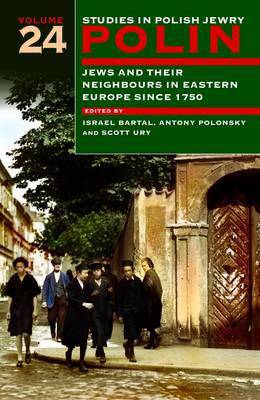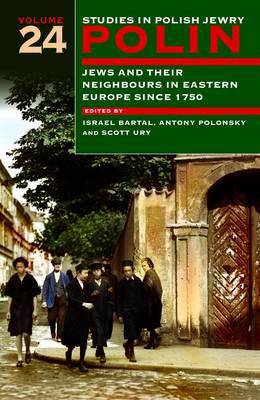
- Afhalen na 1 uur in een winkel met voorraad
- In januari gratis thuislevering in België
- Ruim aanbod met 7 miljoen producten
- Afhalen na 1 uur in een winkel met voorraad
- In januari gratis thuislevering in België
- Ruim aanbod met 7 miljoen producten
Polin: Studies in Polish Jewry Volume 24
Jews and Their Neighbours in Eastern Europe Since 1750
Omschrijving
Relations between Jews and their neighbours in eastern Europe have long been perceived, both in the popular mind and in conventional scholarship, as being in a permanent state of conflict. This volume counters that image by exploring long-neglected aspects of inter-group interaction and exchange. In so doing it broadens our understanding of Jewish history and culture, as well as that of eastern Europe. Whereas traditional historiography concentrates on the differences between Jews and non-Jews, the essays here focus on commonalities: the social, political, and economic worlds that members of different groups often shared. Shifting the emphasis in this way allows quite a different picture to emerge. Jews may have been subject to the whims of ruling powers and influenced by broader cultural and political developments, but at the same time they exerted a discernible influence on them - the social, cultural, and political spheres were ones that they not only shared, but that they also helped to create. This model of reciprocal influence and exchange has much to offer to the study of inter-group relations in eastern Europe and beyond.
Designed to move the study of east European Jewry beyond the intellectual and academic discourse of difference that has long troubled scholars, this volume contributes to our perception of how members of different groups operate and interact on a multitude of different levels. The various contributions represent a wide cross-section of opinions and approaches - historical, literary, and cultural. Taken together they move our understanding of east European Jewry from the realm of the mythical to a more rational mode. In addition to essays considering interactions between Jews and Poles, other contributions examine relations between Jews and other ethnic groups (Lithuanians, Russians), discuss negotiations with various governments (Habsburg, Lithuanian, Polish, Russian, and Soviet), analyse exchanges between Jews and different cultural realms (German, Polish, and Russian), and explore how the politics of memory affects contemporary interpretations of these and related phenomena.
CONTRIBUTORS Karen Auerbach, Israel Bartal, Ela Bauer, Jan Blonski, Marek Edelman, Michael Fleming, Dorota Glowacka, Regina Grol, Francois Guesnet, Brian Horowitz, Agnieszka Jagodinska, Jeff Kopstein, Sergei Kravtsov, Rachel Manekin, Czeslaw Milosz, Karin Neuberger, Przemyslaw Rozanski, Kai Struve, Joanna Tokarska-Bakir, Jerzy Turowicz, Scott Ury, Kalman Weiser, Jason Wittenberg, Marcin Wodzinski, Piotr Wrobel
Specificaties
Betrokkenen
- Uitgeverij:
Inhoud
- Aantal bladzijden:
- 456
- Taal:
- Engels
- Reeks:
- Reeksnummer:
- nr. 24
Eigenschappen
- Productcode (EAN):
- 9781904113928
- Verschijningsdatum:
- 24/11/2011
- Uitvoering:
- Paperback
- Formaat:
- Trade paperback (VS)
- Afmetingen:
- 152 mm x 231 mm
- Gewicht:
- 703 g

Alleen bij Standaard Boekhandel
Beoordelingen
We publiceren alleen reviews die voldoen aan de voorwaarden voor reviews. Bekijk onze voorwaarden voor reviews.








